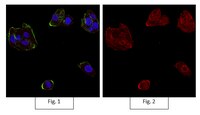MAB1976-AF555 Sigma-AldrichAnti-Integrin αVβ3 Antibody, clone LM609, Alexa Fluor® 555 Conjugate
Anti-Integrin αVβ3 Antibody, clone LM609, Alexa Fluor® 555 Conjugate is an antibody against Integrin αVβ3 for use in Immunocytochemistry.
More>> Anti-Integrin αVβ3 Antibody, clone LM609, Alexa Fluor® 555 Conjugate is an antibody against Integrin αVβ3 for use in Immunocytochemistry. Less<<Produits recommandés
Aperçu
| Replacement Information |
|---|
Tableau de caractéristiques principal
| Species Reactivity | Key Applications | Host | Format | Antibody Type |
|---|---|---|---|---|
| Av, Rb, B, Ca, Ch, H, Mk, Po | ICC | M | AlexaFluor®555 | Monoclonal Antibody |
| References |
|---|
| Product Information | |
|---|---|
| Format | AlexaFluor®555 |
| Presentation | Purified mouse antibody conjugate in PBS with 15 mg/ml BSA and 0.1% sodium azide. |
| Quality Level | MQ100 |
| Physicochemical Information |
|---|
| Dimensions |
|---|
| Materials Information |
|---|
| Toxicological Information |
|---|
| Safety Information according to GHS |
|---|
| Safety Information |
|---|
| Storage and Shipping Information | |
|---|---|
| Storage Conditions | Stable for 1 year at 2-8°C from date of receipt. |
| Packaging Information | |
|---|---|
| Material Size | 100 µL |
| Transport Information |
|---|
| Supplemental Information |
|---|
| Specifications |
|---|
| Global Trade Item Number | |
|---|---|
| Référence | GTIN |
| MAB1976-AF555 | 04055977294729 |
Documentation
Anti-Integrin αVβ3 Antibody, clone LM609, Alexa Fluor® 555 Conjugate FDS
| Titre |
|---|
Anti-Integrin αVβ3 Antibody, clone LM609, Alexa Fluor® 555 Conjugate Certificats d'analyse
Brochure
| Titre |
|---|
| New Products Flyer- Vol 4 Signaling Feature- NEW! Phosphohistidine Antibody |
Posters
| Titre |
|---|
| Post-Translational Modifications |








